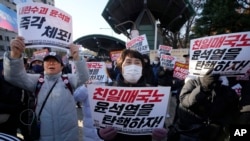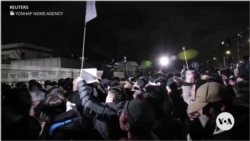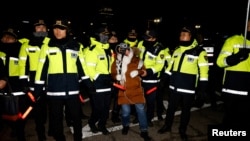South Korean President Yoon Suk Yeol’s brief declaration of martial law appeared to backfire Wednesday, as lawmakers prepared to begin impeachment proceedings and one of the country’s largest labor unions launched an indefinite general strike demanding his resignation.
In a late-night televised address, Yoon announced martial law, claiming it was necessary to “eradicate anti-state forces” and “protect constitutional order.” The declaration marked the first use of martial law since South Korea transitioned to democracy in the 1980s.
Hours later, the edict was overturned after lawmakers pushed past military and police forces that had surrounded parliament and rescinded the decree by a vote of 190-0. Facing overwhelming resistance, Yoon announced that martial law would be lifted.
The dramatic overnight events left many Seoul residents stunned and analysts scrambling to understand Yoon’s strategy, as well as the extent of the political fallout he now faces.
Early Wednesday, South Korea’s main opposition Democratic Party announced it would begin impeachment proceedings if Yoon did not resign immediately.
South Korea's largest umbrella labor group, the Korean Confederation of Trade Unions, vowed to organize major anti-Yoon rallies and announced an indefinite strike until Yoon steps down.
Conservative backlash
In a particularly ominous sign for Yoon, many members of his conservative camp fiercely criticized the martial law declaration, with 18 members of his own People Power Party joining the parliamentary effort to overturn the decree.
In an editorial, the conservative Chosun Ilbo, the country’s largest newspaper, called the situation “absurd and unprecedented,” noting that “hardly anyone” agrees with Yoon’s rationale that the country was facing a national emergency.
"This martial law controversy has cast doubt on President Yoon's ability to remain in office,” said an editorial in the Joongang Ilbo, another conservative paper. “The previously unthinkable discussion of the president's impeachment has now become inevitable."
Yoon has not publicly responded to calls for his resignation. But Yoon’s senior aides, including his chief of staff and national security adviser, offered to resign on Wednesday, after the country’s ruling party chief called for them to step down.
Yoon weakened
Since taking office in May 2022, Yoon, a former chief prosecutor known for his blunt rhetoric, has faced fierce political battles with the opposition and suffered from persistently low approval ratings.
His critics have seized on corruption allegations involving his wife, Kim Keon-hee, and accused him of mistreating the media. In turn, Yoon has frequently portrayed his critics as North Korea sympathizers and "anti-state" forces who are trying to disrupt the normal operation of the government.
In April, Yoon's conservative party suffered a major defeat in legislative by-elections, further weakening his political standing. As a result, only eight conservative lawmakers would need to abandon Yoon in order for an impeachment motion against him to succeed.
The developments suggested to many analysts that Yoon may not be able to serve out the remainder of his single, five-year presidential term.
"This is the end of Yoon's presidency. Full stop," said Karl Friedhoff, who focuses on Korea for the Chicago Council on Global Affairs. "The only question is how his presidency will end and how much violence it will entail."
Impeaching a South Korean president requires the support of two-thirds of the National Assembly, after which the Constitutional Court determines whether to uphold the decision.
Choi Jong-kun, a professor at Seoul's Yonsei University who served as first vice foreign minister under former South Korean President Moon-Jae-in, said that Yoon's impeachment is "definitely" inevitable.
"South Korea's democracy is solid and unshakeable," he added. "It's a republic backed by the organized power of aware and active citizens who are ready to stand up for its values."
Dramatic scenes
The decree — which sought to ban political activities and place media under military control — triggered a frantic late night response at South Korea's National Assembly, the unicameral legislature controlled by Yoon's opponents.
Shortly after his address, South Korean military forces descended on the legislative compound, with some arriving by helicopter, according to a VOA reporter on the scene. Security forces attempted to bar entry to lawmakers and others.
Despite minor scuffles at the main gate, opposition lawmakers eventually forced their way inside, with some livestreaming on social media as they climbed over gates and through windows to reach the legislative chambers.
In an emergency session less than three hours after Yoon's declaration, lawmakers voted to lift the decree. Under South Korea's constitution, the president is required to comply when a majority of lawmakers vote to overturn martial law.
Kim Joon-hyung, a member of the opposition Rebuilding Korea Party, described wrestling through security forces to enter the National Assembly. "I'm sore all over," he said in a text message to VOA, noting that the military seemed "confused" and ultimately refrained from aggressive actions to block lawmakers.
Videos of civilian resistance against the military circulated widely in South Korean media. In one clip, dozens of people surrounded an armored vehicle outside parliament, preventing further access. In another, aides and civilians sprayed fire extinguishers at military personnel attempting to breach an entrance, forcing them to retreat under the glare of journalists’ cameras.
As South Korean martial law troops left South Korea's National Assembly early Wednesday, one of the soldiers repeatedly bowed his head and said, "I'm sorry,” according to a video posted on YouTube by a local journalist.
The dramatic scenes evoked memories of South Korea's authoritarian past, underscoring public resistance to any return to military rule and adding further pressure to Yoon’s already embattled presidency.
“I’m stunned by the news. I feel like I’ve been surrealistically teleported back to the Korea I first experienced as a U.S. diplomat in 1984,” said Rob Rapson, a former U.S. diplomat who served in numerous senior positions at the U.S. Embassy in Seoul.
“I can’t fathom what possessed Yoon to announce martial law and think that he could get away with it in the dark of night. His stated reasons about eradicating ‘anti-state’ forces have little credibility [and] are indefensible,” he added.
The developments create an awkward dilemma for the outgoing Biden administration, which had closely aligned with Yoon on a shared vision of "values-based diplomacy." Together, they often stood in concert against authoritarian adversaries like China and Russia, emphasizing democracy, human rights, and the rule of law as central to their foreign policies.
On Tuesday, U.S. Deputy Secretary of State Kurt Campbell expressed “grave concern” over the situation and said he was actively engaging with South Korean counterparts.
In a statement, U.S. Secretary of State Antony Blinken welcomed Yoon’s decision to rescind martial law but stopped short of criticizing the South Korean leader.
South Korea, home to about 28,000 U.S. troops, remains one of Washington’s most critical allies in the region.








